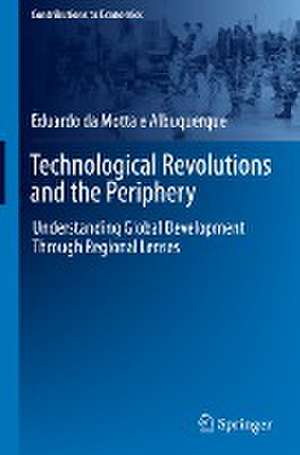Technological Revolutions and the Periphery: Understanding Global Development Through Regional Lenses: Contributions to Economics
Autor Eduardo da Motta e Albuquerqueen Limba Engleză Hardback – 14 oct 2023
Din seria Contributions to Economics
- 18%
 Preț: 1001.81 lei
Preț: 1001.81 lei -
 Preț: 90.83 lei
Preț: 90.83 lei - 15%
 Preț: 649.06 lei
Preț: 649.06 lei - 18%
 Preț: 1109.92 lei
Preț: 1109.92 lei - 24%
 Preț: 657.09 lei
Preț: 657.09 lei - 18%
 Preț: 976.54 lei
Preț: 976.54 lei - 17%
 Preț: 361.03 lei
Preț: 361.03 lei - 18%
 Preț: 1027.83 lei
Preț: 1027.83 lei -
 Preț: 283.93 lei
Preț: 283.93 lei - 15%
 Preț: 644.95 lei
Preț: 644.95 lei - 15%
 Preț: 638.24 lei
Preț: 638.24 lei -
 Preț: 394.29 lei
Preț: 394.29 lei - 15%
 Preț: 636.80 lei
Preț: 636.80 lei - 15%
 Preț: 637.78 lei
Preț: 637.78 lei - 18%
 Preț: 723.69 lei
Preț: 723.69 lei - 15%
 Preț: 635.47 lei
Preț: 635.47 lei - 15%
 Preț: 634.00 lei
Preț: 634.00 lei -
 Preț: 392.75 lei
Preț: 392.75 lei -
 Preț: 383.33 lei
Preț: 383.33 lei - 15%
 Preț: 637.28 lei
Preț: 637.28 lei - 15%
 Preț: 636.80 lei
Preț: 636.80 lei - 18%
 Preț: 950.96 lei
Preț: 950.96 lei - 15%
 Preț: 634.68 lei
Preț: 634.68 lei -
 Preț: 387.38 lei
Preț: 387.38 lei - 15%
 Preț: 647.27 lei
Preț: 647.27 lei - 15%
 Preț: 636.63 lei
Preț: 636.63 lei - 15%
 Preț: 639.73 lei
Preț: 639.73 lei -
 Preț: 385.62 lei
Preț: 385.62 lei - 15%
 Preț: 641.85 lei
Preț: 641.85 lei - 20%
 Preț: 649.60 lei
Preț: 649.60 lei - 15%
 Preț: 641.71 lei
Preț: 641.71 lei -
 Preț: 387.96 lei
Preț: 387.96 lei - 15%
 Preț: 645.47 lei
Preț: 645.47 lei -
 Preț: 385.08 lei
Preț: 385.08 lei - 15%
 Preț: 646.62 lei
Preț: 646.62 lei -
 Preț: 383.33 lei
Preț: 383.33 lei - 15%
 Preț: 638.43 lei
Preț: 638.43 lei -
 Preț: 381.21 lei
Preț: 381.21 lei - 15%
 Preț: 642.51 lei
Preț: 642.51 lei - 15%
 Preț: 637.78 lei
Preț: 637.78 lei - 15%
 Preț: 641.71 lei
Preț: 641.71 lei -
 Preț: 384.70 lei
Preț: 384.70 lei -
 Preț: 379.86 lei
Preț: 379.86 lei -
 Preț: 378.34 lei
Preț: 378.34 lei -
 Preț: 384.70 lei
Preț: 384.70 lei -
 Preț: 388.52 lei
Preț: 388.52 lei - 15%
 Preț: 641.71 lei
Preț: 641.71 lei -
 Preț: 381.00 lei
Preț: 381.00 lei - 15%
 Preț: 644.95 lei
Preț: 644.95 lei -
 Preț: 386.00 lei
Preț: 386.00 lei
Preț: 784.30 lei
Preț vechi: 956.46 lei
-18% Nou
Puncte Express: 1176
Preț estimativ în valută:
150.09€ • 162.98$ • 126.08£
150.09€ • 162.98$ • 126.08£
Carte tipărită la comandă
Livrare economică 22 aprilie-06 mai
Preluare comenzi: 021 569.72.76
Specificații
ISBN-13: 9783031434358
ISBN-10: 3031434358
Ilustrații: XIII, 219 p.
Dimensiuni: 155 x 235 mm
Greutate: 0.51 kg
Ediția:1st ed. 2023
Editura: Springer International Publishing
Colecția Springer
Seria Contributions to Economics
Locul publicării:Cham, Switzerland
ISBN-10: 3031434358
Ilustrații: XIII, 219 p.
Dimensiuni: 155 x 235 mm
Greutate: 0.51 kg
Ediția:1st ed. 2023
Editura: Springer International Publishing
Colecția Springer
Seria Contributions to Economics
Locul publicării:Cham, Switzerland
Cuprins
Introduction.- Chapter 1: Theoretical framework and methodology.- Chapter 2: The impact of industrial revolution on the periphery - an "astonishing reversal".- Chapter 3: Two technological revolutions and a predominantly falling behind period.- Chapter 4: The fourth Long Wave and a predominantly limited catch up phase.- Chapter 5: The invention of the www, a new "reversal" and a new international division of labor.- Chapter 6: Heterogeneity at the periphery and the current reconfiguration of global capitalism.- Conclusion: towards an agenda for international reform.
Notă biografică
Eduardo da Motta e Albuquerque is Full Professor at the Department of Economics at the Federal University of Minas Gerais (Brazil). He received his PhD in economics at the Federal University of Rio de Janeiro. He teaches undergraduate and graduate courses in economics of science and technology, contemporary political economy, and evolutionary microeconomics. His research focuses on integrating evolutionary economics with the economics of development.
Textul de pe ultima copertă
This book evaluates the uneven propagation of technological revolutions, investigating the roots of this phenomenon in the absorptive capabilities that are built by countries and regions at the periphery. To understand this global process, this book looks to two dimensions: time and geography. Temporally, the book follows the sequence of technological revolutions in the last 250 years. With regard to geography, the book studies five different regions at the periphery—China, India, Africa, Russia and Latin America—to understand how they differ in the institutional processes that shape their absorptive capabilities. Focusing on each technological revolution and its impact on those five peripheric regions, the chapters illustrate how each region coped with each shock wave emanating from the center. Providing a truly global outlook of a complex system with a dynamic nature, this book will be of interest to researchers and students of development economics, the economics of innovation, evolutionary economics, and the economics of science and technology.
Caracteristici
Evaluates the uneven propagation of technological revolutions Discusses the impact of technological revolution from the perspective of countries at the periphery Uses absorptive capacity as a tool for understanding heterogeneity at the periphery
